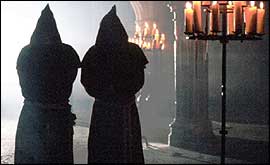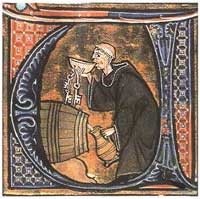The complete Rule of St. Benedict in English
The original Latin Text of the Rule of St Benedict.
St Benedict was born in Nursia, Italy, in about 480, and educated in Rome where he became so upset by the licentiousness he found there, that he withdrew from the world and retired in about 500 to a cave in Subiaco by the river Aniene, where he lived as hermit for some years. A community gradually grew up around him and he established twelve monasteries of twelve monks each, with abbots appointed by himself. Local jealousy prompted him to leave Subiaco, and in about 525 he moved with a small band of monks to Monte Cassino, where he remained till his death in about 550. It was from here that he elaborated his plans for the reform of monasticism and composed his rule in about 530.
The rule was originally intended for laymen, and was drawn from the works of Cassian, Basil and Caesarius od Arles. Full authority is given to the abbot, and though he himself is elected, a patriarchal form of government is envisaged. The main 'function' of the monk is the performance of the divine office, from which the rest of their lives take their inpiration - the round of work, private prayer and study.

Chapter 1 Defines the four kinds of monks:
- Cenobites, i.e. monastics, who live under the rule of an Abbot;
- Anchorites, or hermits, those who, after long successful training in a monastery, are now coping single-handedly, with only God for their help;
- Sarabaites, - 'a most vile class of monks...Living in two's and three's, or even singly, without a shepherd, enclosed, not in the Lord's sheepfold, but in their own, the gratification of their desires is law unto them; because what they choose to do they call holy, but what they dislike they hold to be unlawful'.
- Landlopers, 'who keep going their whole life long from one province to another, staying three or four days at a time in different cells as guests. Always roving and never settled, they indulge their passions and the cravings of their appetite, and are in every way worse than the Sarabaites.'
The rule is therefore written 'for that most valiant kind of monks, the Cenobites'
Chapter 2 What kind of man the Abbot ought to be. It forbids him to make distinction of persons in the monastery except for particular merit, and warns him that at the same time, he will be answerable for the salvation of the souls committed to his care.
 Chapter 3 The abbot should consult the whole community in matters of importance, and then come to a decision; that decision should be accepted and obeyed by the the community.
Chapter 3 The abbot should consult the whole community in matters of importance, and then come to a decision; that decision should be accepted and obeyed by the the community.
Chapter 4 A list of 73 Instruments of good works.
Chapter 5 Of Obedience. The fulfilment of the monastic vow of obedience to a superior, ' This obedience, however, will be acceptable to God and agreeable to men then only, if what is commanded is done without hesitation, delay, lukewarmness, grumbling or complaint, because the obedience which is rendered to Superiors is rendered to God.
Chapter 6 Of Silence, 'Therefore, because of the importance of silence, let permission to speak be seldom given to perfect disciples even for good and holy and edifying discourse, ... For it belongeth to the master to speak and to teach; it becometh the disciple to be silent and to listen. ' Jests and laughter are not approved.
Chapter 7 Of humility, A long section in which virtue is divided into twelve degrees or steps in the ladder that leads to heaven. They are: (1) fear of God; (2) repression of self-will; (3) submission of the will to superiors for the love of God; (4) obedience in difficult, contrary or even unjust conditions; (5) confession of sinful thoughts and secret wrong-doings; (6) contentment with the lowest and most menial treatment and acknowledgment of being "a poor and worthless workman" in the given task; (7) honest acknowledgement of one's inferiority to all others; (8) being guided only by the monastery's common rule and the example of the superiors; (9) speaking only when asked a question; (10) stifling ready laughter; (11) seriousness, modesty, brevity and reasonableness in speech and a calm voice; (12) outward manifestation of the interior humility.
 Chapters 8 - 11, 14 How the Night office is to be said
Chapters 8 - 11, 14 How the Night office is to be said
Chapters 12 - 13 on the Office of Lauds
Chapters 14 - 19 The recitation of the Psalter at the Hours of prayer (Lauds, Prime, Tierce, Sext, None, Vespers, and Compline,) and the way of reciting them
Chapter 20 Prayer should be made with purity of heart rather than many words, and in community always short and concluded at the sign given by the superior.
Chapter 21 Deans and Priors should be chosen for the merit of their life, wisdom and knowledge.
Chapter 22 Dormitory regulations: each monk is to have a separate bed and is to sleep in his habit, so as to be ready to rise without delay [for early Vigils], and a light should be kept burning constantly until morning.
Chapter 23-29 deal with contumacy, disobedience, pride and other grave faults for which a graduated scale of punishments is provided: first, private admonition; next, public reproof; then separation from the brethren at meals and elsewhere; and finally excommunication (or in the case of those lacking understanding of what this means, corporal punishment instead). The abbot, like a wise physician and good shepherd, is to arrange for mature and wise members of the community to counsel wayward members in private, while all offer prayers in support, so that in compassion those who show themselves sick by their conduct may, in compassion, be carried back to the flock. After frequent reproofs and maybe even excommunication has proved unavailing, corporal punishment is to be dispensed. If every effort to help a wayward member reform has failed, the abbot and community are to pray for him, "so that the Lord, who can do all things, may bring about the 'health' of the 'sick' brother". If this does not "heal" him, the abbot is to send him away to protect the community. If a wayward brother leaves the monastery, he must be received again, if he promises to make amends; but after the third time acceptance is to be denied.
Chapter 30 How young boys are to be corrected - fasting and corporal punishment.
Chapter 31 - 32 order the appointment of a cellerar and other officials, to take charge of the various goods of the monastery, which are to be treated with as much care as the consecrated vessels of the altar.
Chapter 33 - 34 Everything is to be held in common, and private possessions are forbidden unless specifically allowed by the abbot, who will supply everything that an individual needs.
Chapter 35 Weekly service in the kitchen should be undertaken by all, except the Cellarer - for which they get some extra wine and bread.
Chapter 36 and 37 order due care for the sick, the old, and the young. They are to have some dispensations from the rule, and be offered more baths, meat etc and they can eat before regular hours.
Chapter 38 Reading aloud should accompany meals, and starting on a Sunday, one person should do it for a week. Signs are to be used for whatever may be wanted at meals, so the reader is not interrupted.
 Chapter 39 - 40 regulate the quantity and quality of the food and drink. Two meals a day are allowed and two dishes of cooked food at each. A pound of bread also and a hemina (probably about half a pint) of wine for each monk. Flesh-meat is prohibited except for the sick and the weak, and it is always within the abbot's power to increase the daily allowance when he sees fit.
Chapter 39 - 40 regulate the quantity and quality of the food and drink. Two meals a day are allowed and two dishes of cooked food at each. A pound of bread also and a hemina (probably about half a pint) of wine for each monk. Flesh-meat is prohibited except for the sick and the weak, and it is always within the abbot's power to increase the daily allowance when he sees fit.
Chapter 41 prescribes the hours of the meals, which are to vary according to the time of year.
Chapter 42 After the evening meal the monks are to assemble to hear edifying literature read - Cassian's Conferences or the lives of the Saints - 'not, however, the Heptateuch or the Books of the Kings, because it would not be wholesome for weak minds to hear this part of the Scripture at that hour' . Compline follows, after which strict silence is to be observed.
Chapters 43-46 Minor faults and their punishments.
Chapter 47 The abbot appoints the singers, readers etc for the services in church.
Chapter 48 emphasizes the importance of manual labour and arranges time to be devoted to it daily. This varies according to the season, but is apparently never less than about five hours a day. The times at which the lesser of the "day-hours" (Prime, Terce, Sext, and None) are to be recited control the hours of labour somewhat, and the abbot is instructed not only to see that all work, but also that the employments of each are suited to their respective capacities.
Chapter 49 treats of the observance of Lent, and recommends some voluntary self-denial for that season, with the abbot's sanction.
Chapters 50 - 51 contain rules for monks who are working in the fields or travelling. They are directed to join in spirit, as far as possible, with their brethren in the monastery at the regular hours of prayers.
Chapter 52 commands that the oratory be used for purposes of devotion only.
Chapter 53 is concerned with the treatment of guests, who are to be received "as Christ Himself". The guests are to be met with due courtesy by the abbot or his deputy, and during their stay they are to be under the special protection of a monk appointed for the purpose. They are to dine from the abbot's kitchen so as not to disturb the life of the community, with whom they are not to associate except by special permission.
Chapter 54 forbids the monks to receive letters or gifts without the abbot's leave.
Chapter 55 Monks' footgear and clothing.' For a temperate climate a cowl and a tunic for each monk are sufficient, -- a woolen cowl for winter and a thin or worn one for summer, and a scapular for work, and stockings and shoes as covering for the feet' - they are to have two tunics and cowls to allow for washing, and when travelling shall be supplied with clothes of rather better quality. The old habits are to be put aside for the poor. ' For their bedding, let a straw mattress, a blanket, a coverlet, and a pillow be sufficient.'
Chapter 56 The abbot shall take his meals with the guests.
Chapter 57 enjoins humility on the craftsmen of the monastery, and if their work is for sale, it shall be rather below than above the current trade price.
Chapter 58 Rules for the admission of new brethren - which is not to be made too easy. The newcomer first spends a short time as a guest; then he is admitted to the novitiate, where under the care of a novice-master, his vocation is severely tested; during this time he is always free to depart. If after twelve months' probation, he still perseveres, he may be admitted to promise 'in the presence of all, before God and His saints, stability, the conversion of morals, and obedience, in order that, if he should ever do otherwise, he may know that he will be condemned by God "Whom he mocketh.," binding himself for life to the monastery of his profession.
Chapter 59 The admission of boys to the monastery under certain conditions.
Chapter 60 The position of priests who wish to join the community. They can only exercise their priestly functions by permission of the abbot, and they must follow the whole disciple of the Rule.
Chapter 61 Monks from elsewhere who wish to stay and perhaps join the community; in the latter case, permission should be sought from his own abbot.
Chapter 62 - 3 lays down that precedence in the community shall be determined by the date of admission, merit of life, or the appointment of the abbot; this includes those who become priests of deacons.
Chapter 64 The election of an abbot should be by the whole community and he should be chosen for his charity, zeal, and discretion.
Chapter 65 Appointment of a prior. The prior must not think himself another abbot, But let the Prior reverently do what his Abbot hath enjoined on him, doing nothing against the will or the direction of the Abbot; Should he do so he may be admonished, deposed, or expelled for misconduct.
Chapter 66 Appointment of a porter for the monastery gate, and If it can be done, the monastery should be so situated that all the necessaries, such as water, the mill, the garden, are enclosed, and the various arts may be plied inside of the monastery, so that there may be no need for the monks to go about outside, because it is not good for their souls.
 Chapter 67 gives instruction as to the behaviour of a monk who is sent on a journey.
Chapter 67 gives instruction as to the behaviour of a monk who is sent on a journey.
Chapter 68 orders that all shall cheerfully attempt to do whatever is commanded them, however hard it may seem.
Chapter 69 forbids the monks from defending one another.
Chapter 70 prohibits them from striking one another.
Chapter 71 encourages the brethren to be obedient not only to the abbot and his officials, but also to one another.
Chapter 72 is a brief exhortation to zeal and fraternal charity
Chapter 73 is an epilogue declaring that this Rule is not offered as an ideal of perfection, but merely as a means towards godliness and is intended chiefly for beginners in the spiritual life.